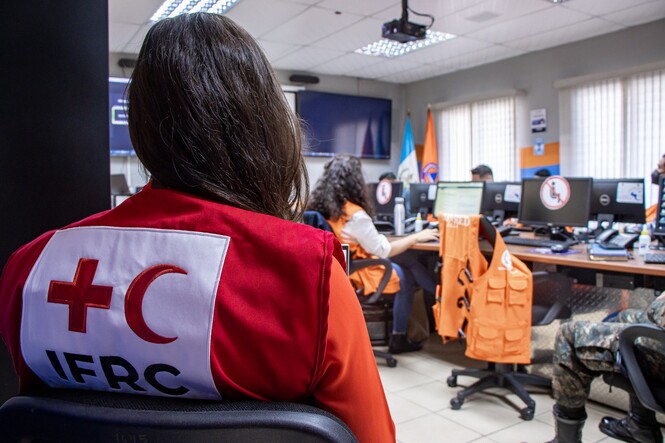
More than 1000 people attended the simulation from across sectors including participants from customs, foreign affairs, logistics, migration authorities and civil protection.
Before the simulation began, IFRC Disaster Law prepared participants in the foundations of International Disaster Response Law (IDRL), through a briefing on the IDRL Guidelines Recommendations for MecReg – SICA, the Regional Mechanism for Humanitarian Assistance in Disasters of the Central American Integration System.
During the simulation, IFRC Disaster Law acted as an evaluator, reviewing compliance of the protocols for domestic and regional international humanitarian assistance.
The Disaster Law team then held interviews with the National Specialised Groups of Urban Search and Rescue, who are some of the key groups of national humanitarian responders in the region, to learn about their findings and experiences of the MecReg and Centro American Protocol. This allowed IFRC Disaster Law to advise and advocate, through their simulation feedback, for how the IDRL recommendations, namely legal facilities, can be best incorporated throughout the whole emergency response cycle.
Rebeca Muñoz, IFRC Disaster Law Officer for the Americas Regional Office, said participants agreed on the importance of updating the protocols for international humanitarian assistance, and the regional mechanism for mutual aid in disasters, with the IDRL Guidelines being a good tool to use.
“The IDRL Guidelines are needed because most countries in the region do not have specific laws in place for facilitating and regulating international relief. Without the right laws in place, responses may not be sufficiently coordinated and can be ineffective.
"The best time to strengthen a country's law and policy for international assistance is not when a disaster has hit. The IDRL Guidelines are designed to help governments to prepare for them before disasters strike.”
The IDRL Guidelines are a tool that can improve the quality and efficiency of international disaster relief and initial recovery assistance in the region, to better serve disaster-affected communities when they need help the most.